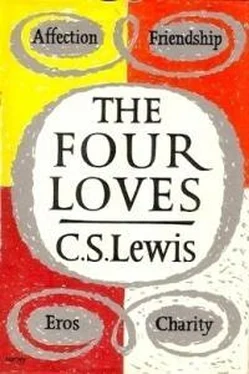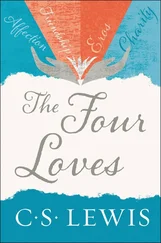But not all. I am old enough to remember the sad case of Dr. Quartz. No university boasted a more effective or devoted teacher. He spent the whole of himself on his pupils. He made an indelible impression on nearly all of them. He was the object of much well merited hero–worship. Naturally, and delightfully, they continued to visit him after the tutorial relation had ended—went round to his house of an evening and had famous discussions. But the curious thing is that this never lasted. Sooner or later—it might be within a few months or even a few weeks—came the fatal evening when they knocked on his door and were told that the Doctor was engaged. After that he would always be engaged. They were banished from him forever. This was because, at their last meeting, they had rebelled. They had asserted their independence—differed from the master and supported their own view, perhaps not without success. Faced with that very independence which he had laboured to produce and which it was his duty to produce if he could, Dr. Quartz could not bear it. Wotan had toiled to create the free Siegfried; presented with the free Siegfried, he was enraged. Dr. Quartz was an unhappy man.
This terrible need to be needed often finds its outlet in pampering an animal. To learn that someone is "fond of animals" tells us very little until we know in what way. For there are two ways. On the one hand the higher and domesticated animal is, so to speak, a "bridge" between us and the rest of nature. We all at times feel somewhat painfully our human isolation from the sub–human world—the atrophy of instinct which our intelligence entails, our excessive self–consciousness, the innumerable complexities of our situation, our inability to live in the present. If only we could shuffle it all off! We must not—and incidentally we can't—become beasts. But we can be with a beast. It is personal enough to give the word with a real meaning; yet it remains very largely an unconscious little bundle of biological impulses. It has three legs in nature's world and one in ours. It is a link, an ambassador. Who would not wish, as Bosanquet put it, "to have a representative at the court of Pan"? Man with dog closes a gap in the universe. But of course animals are often used in a worse fashion. If you need to be needed and if your family, very properly, decline to need you, a pet is the obvious substitute. You can keep it all its life in need of you. You can keep it permanently infantile, reduce it to permanent invalidism, cut it off from all genuine animal well–being, and compensate for this by creating needs for countless little indulgences which only you can grant. The unfortunate creature thus becomes very useful to the rest of the household; it acts as a sump or drain—you are too busy spoiling a dog's life to spoil theirs. Dogs are better for this purpose than cats: a monkey, I am told, is best of all. Also it is more like the real thing. To be sure, it's all very bad luck for the animal. But probably it cannot fully realise the wrong you have done it. Better still, you would never know if it did. The most down–trodden human, driven too far, may one day turn and blurt out a terrible truth. Animals can't speak.
Those who say "The more I see of men the better I like dogs"—those who find in animals a relief from the demands of human companionship—will be well advised to examine their real reasons.
I hope I am not being misunderstood. If this chapter leads anyone to doubt that the lack of "natural affection" is an extreme depravity I shall have failed. Nor do I question for a moment that Affection is responsible for nine–tenths of whatever solid and durable happiness there is in our natural lives. I shall therefore have some sympathy with those whose comment on the last few pages takes the form "Of course. Of course. These things do happen. Selfish or neurotic people can twist anything, even love, into some sort of misery or exploitation. But why stress these marginal cases? A little common sense, a little give and take, prevents their occurrence among decent people." But I think this comment itself needs a commentary.
Firstly, as to neurotic . I do not think we shall see things more clearly by classifying all these malefical states of Affection as pathological. No doubt there are really pathological conditions which make the temptation to these states abnormally hard or even impossible to resist for particular people. Send those people to the doctors by all means. But I believe that everyone who is honest with himself will admit that he has felt these temptations. Their occurrence is not a disease; or if it is, the name of that disease is Being a Fallen Man. In ordinary people the yielding to them—and who does not sometimes yield?—is not disease, but sin. Spiritual direction will here help us more than medical treatment. Medicine labours to restore "natural" structure or "normal" function. But greed, egoism, self–deception and self–pity are not unnatural or abnormal in the same sense as astigmatism or a floating kidney. For who, in Heaven's name, would describe as natural or normal the man from whom these failings were wholly absent? "Natural", if you like, in a quite different sense; archnatural, unfallen. We have seen only one such Man. And He was not at all like the psychologist's picture of the integrated, balanced, adjusted, happily married, employed, popular citizen. You can't really be very well "adjusted" to your world if it says you "have a devil" and ends by nailing you up naked to a stake of wood.
But secondly, the comment in its own language admits the very thing I am trying to say. Affection produces happiness if—and only if—there is common sense and give and take and "decency". In other words, only if something more, and other, than Affection is added. The mere feeling is not enough. You need "common sense", that is, reason. You need "give and take"; that is, you need justice, continually stimulating mere Affection when it fades and restraining it when it forgets or would defy the art of love. You need "decency". There is no disguising the fact that this means goodness; patience, self–denial, humility, and the continual intervention of a far higher sort of love than Affection, in itself, can ever be. That is the whole point. If we try to live by Affection alone, Affection will "go bad on us".
How bad, I believe we seldom recognise. Can Mrs. Fidget really have been quite unaware of the countless frustrations and miseries she inflicted on her family? It passes belief. She knew—of course she knew—that it spoiled your whole evening to know that when you came home you would find her uselessly, accusingly, "sitting up for you". She continued all these practices because if she had dropped them she would have been faced with the fact she was determined not to see; would have known that she was not necessary. That is the first motive. Then too, the very laboriousness of her life silenced her secret doubts as to the quality of her love. The more her feet burned and her back ached, the better, for this pain whispered in her ear "How much I must love them if I do all this!" That is the second motive. But I think there is a lower depth. The unappreciativeness of the others, those terrible, wounding words—anything will "wound" a Mrs. Fidget—in which they begged her to send the washing out, enabled her to feel ill–used, therefore, to have a continual grievance, to enjoy the pleasures of resentment. If anyone says he does not know those pleasures, he is a liar or a saint. It is true that they are pleasures only to those who hate. But then a love like Mrs. Fidget's contains a good deal of hatred. It was of erotic love that the Roman poet said, "I love and hate," but other kinds of love admit the same mixture. They carry in them the seeds of hatred. If Affection is made the absolute sovereign of a human life the seeds will germinate. Love, having become a god, becomes a demon.
Читать дальше











